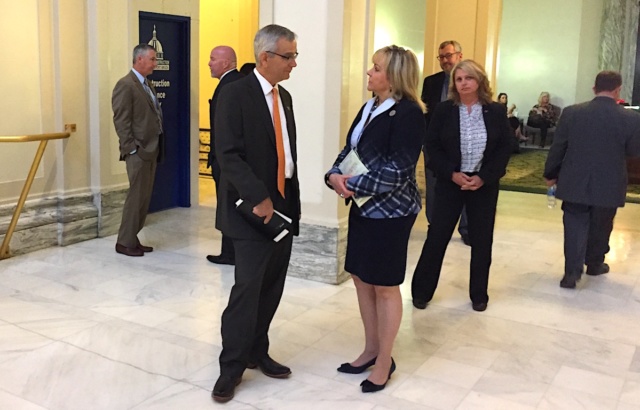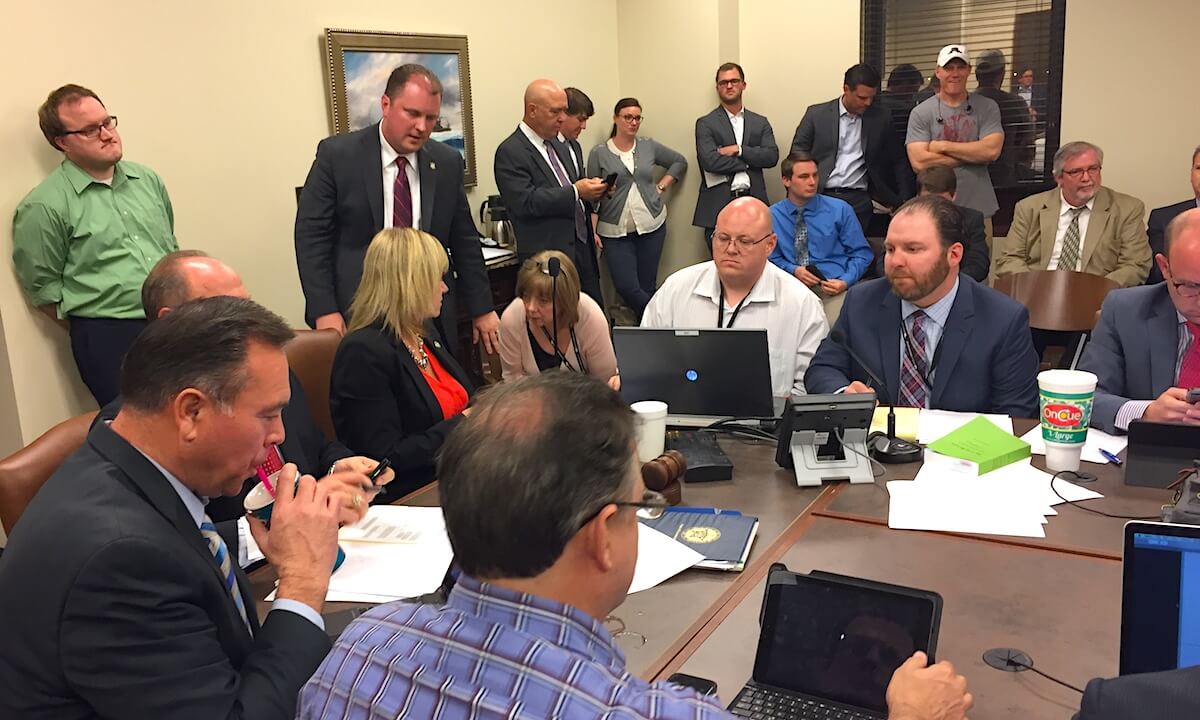

(Update: This post was updated at 4:50 p.m. Wednesday, May 24, to clarify that Gov. Mary Fallin has committed to sign SB 860 as the general appropriations bill being considered by the full Senate and then the full House, according to chief of staff Chris Benge.)
Gov. Mary Fallin appeared on the fourth floor rotunda this afternoon shortly after the Senate reconvened in preparation for hearing SB 860, the primary budget bill passed out of committee in the wee hours of Wednesday morning.
Fallin answered three other questions from NonDoc. Her comments appear below.
What’s your feeling on how the budget looks at this moment and how things have gone?
There’s no doubt that this session has been very difficult for members of the House, the Senate and all of the state agencies. Any time you have a large budget gap like we’ve experienced this year with many mitigating factors that have caused it, it’s difficult to try to find a way to balance the budget. There’s been a lot of discussion between all the different caucuses.
Between my office and many members, and for the last two weeks we’ve had members of the House and Senate Republicans and Democrats, different committee chairs, different House and Senate staff members that draft bills in my office working sometimes up until midnight or later even within the Capitol itself.
But the House and Senate are working on GA bills that they hope to be able to possibly get passed out of their different bodies. There’s two different bills, from what I understand, and there’s a little bit of difference between the two. In the end, it’s going to require at least 51 votes to be able to get it done. But we’ll see. But I hope we can get a budget done this week because it’s not productive to have a special session unless we absolutely can’t get a budget done.
It looks like, for some agencies, there’ll be 4 to 5 percent cuts. Would you have preferred a grand bargain that raised even more revenue? I think you said that from the beginning, that you wanted to change the structure. So what hasn’t been accomplished, and what’s your feeling on how that all went down?
I wish we would have spent more time, as I proposed back in February at my State of the State speech, that we would look at the structure of our budget and put a more solid foundation so that we don’t keep having shortfalls every year because of online shopping — we lose hundreds of millions of dollars on online shopping — and of course the energy sector has not recovered yet. They’re on the verge of beginning to recover, but not there yet.
So we need to find a way that we can get recurring revenue in our budget versus what’s been done for decades in the Capitol — not just last year, but for decades — where they take one-time revenue and revolving funds and move it around to balance the budget where it’s really not balanced. That I will not be pleased with out here for this budget because it’s just been impossible to find revenue to make up all the shortfall that we have.
But there is revenue on the table. That’s a good thing. There will be agency cuts, which I think there are some who want less spending in state government. We always want to look out for ways to eliminate wasteful spending and make things more efficient and effective, but I’ve also cautioned the Legislature that we can’t make draconian cuts to our budgets where our agencies aren’t functioning the way they should. We have deep cuts that have already occurred to so many of our agencies already that we’ve got to be really, really careful in what we’re doing.
So we’ll see what happens with what the House and Senate this week, if they can get the votes passed. The Democrat party is locked up on a lot of these key issues that would be revenue enhancements, but that’s politics at the Capitol.
The public seems to be a little frustrated with how this came down in the 23rd hour. There was not a ton of transparency and ability to look over the bills and stuff like that. What can you speak to in terms of that process and what you want to see the Speaker, the Pro Tempore and the Minority Leader to do next year to increase that transparency?
I think if they would have come to the table to my office sooner, it would have been more helpful. We tried. I always have the Speaker and Pro Tempore to the governor’s mansion on Tuesday mornings for breakfast meetings. But about two months ago, they started cancelling out on that meeting because they were working within their own caucuses.
But I think part of the problem this year has been, when you have such a large shortfall and you can’t make the difference up by revolving funds and one-time funds, then you have to go get your caucus members to agree. And it’s challenging within the caucuses to get members to agree. And then when you have the opposite political party locking up 100 percent and saying, ‘We’re not going to do anything unless you give us a 5 or 7 percent gross production tax,’ it causes things to break down at the Capitol and makes things much more difficult.
RELATED: Budget bill(s) unveiled
GOP pivots, moves budget needing only 51 House votes by William W. Savage III





















